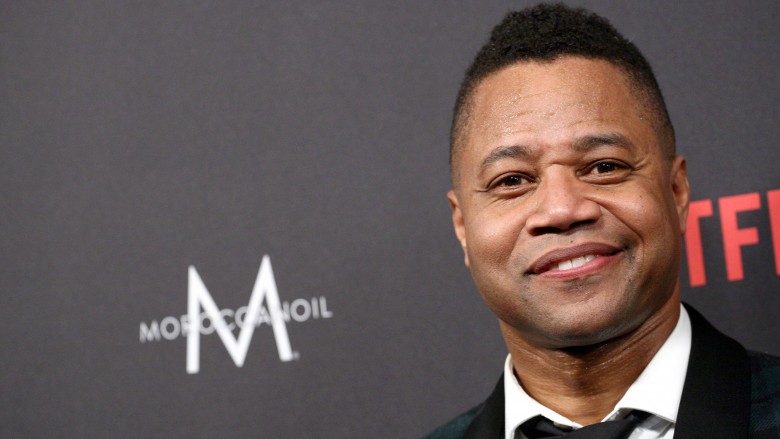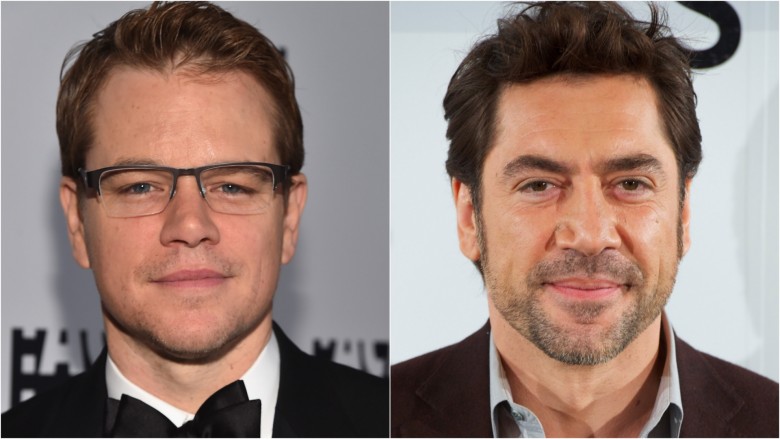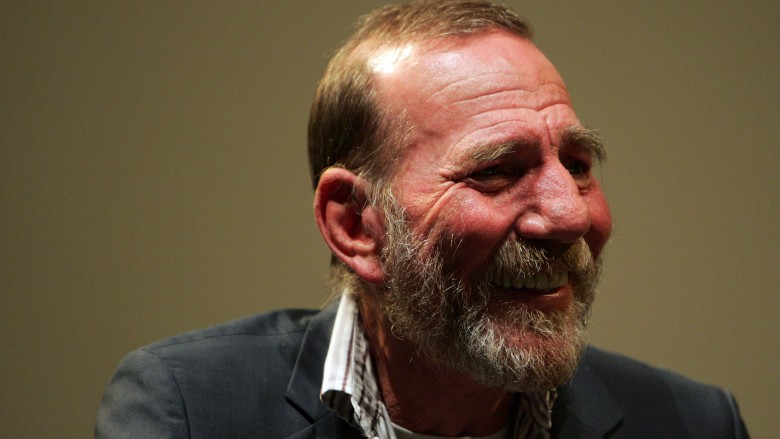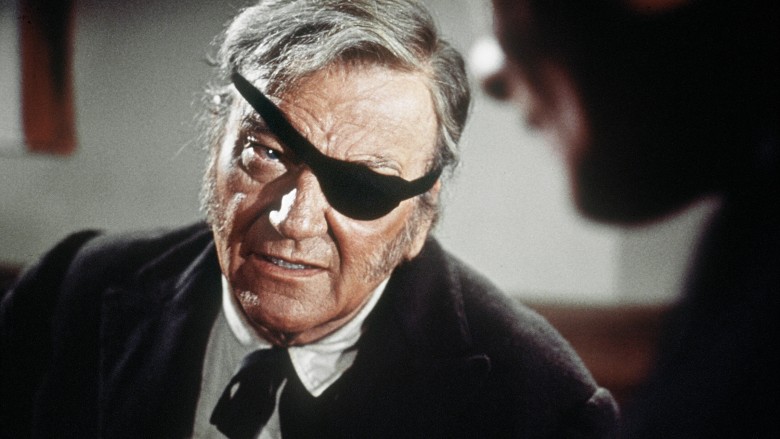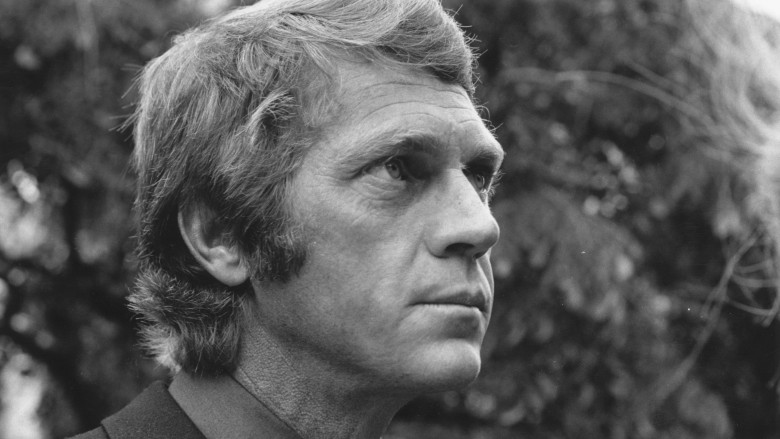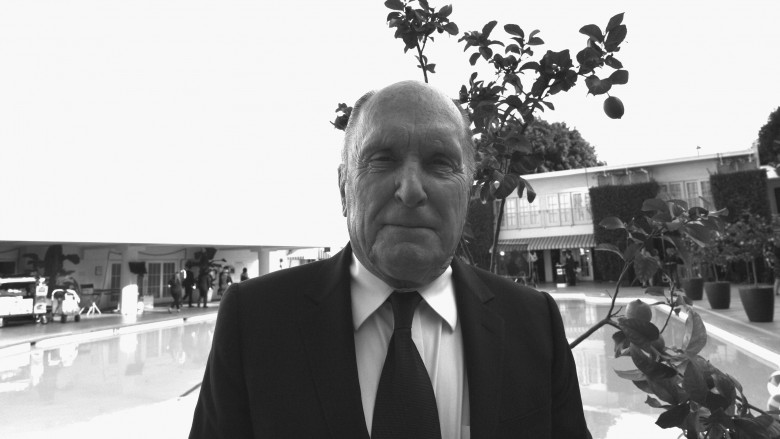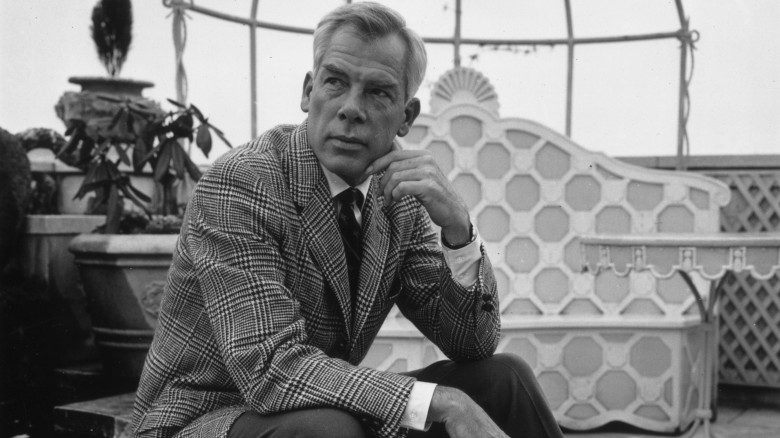Actors Who Refused Huge Roles In Spielberg Movies
He's been praised by Alfred Hitchcock, Werner Herzog, and Paul Thomas Anderson. He's won two Oscars, made some of the highest grossing-films of all time, and been hailed as one the greatest directors in cinematic history. But despite his amazing reputation, Steven Spielberg occasionally has trouble getting actors to play in his movies. We've already read about how Tom Selleck turned down the role of Indiana Jones, but believe it or not, that's just the tip of the cinematic iceberg.
Cuba Gooding, Jr.
While winning an Academy Award seems like a dream come true, it sometimes seems to come with a pretty powerful curse. People like F. Murray Abraham, Mercedes Ruehl, Roberto Benigni, and Louise Fletcher kind of disappeared from the limelight after picking up their prizes, and perhaps the king of the Oscar curse is Mr. "Show Me the Money" himself, Cuba Gooding, Jr.
After taking home a Best Supporting Oscar for his comic turn in Jerry Maguire, Gooding let his pride get the better of him. As he explained, "I remember this interview I read (with) Christopher Reeve talking about Superman. What other role could live up to being Superman?...I bought into that." Basically, with his Oscar in hand, Gooding viewed himself as a superhero, unconcerned with acting parts for mere mortals.
Searching for the perfect role, Gooding turned down several amazing opportunities. For example, he said no to Hotel Rwanda. Similarly, when Spielberg asked Gooding to play Cinque—a slave who leads a mutiny against his captors—in the film Amistad, Gooding said no thanks. As he put it, "Steven Spielberg came to me and said, 'I want you to be in Amistad, and I said, 'It's a slave role; show me the money. I'm so a big thing.' And he goes, 'I can direct you.' And I said, 'No, I have to pass.'"
It's a decision that Gooding majorly regrets today, especially after starring in a host of direct-to-DVD dumpster fires. Fortunately, he's since changed his tune and is now more concerned with working alongside quality filmmakers than picking perfect parts. The man is also experiencing a career resurgence thanks to his work in American Crime Story. Here's hoping he can keep on killing it with his performances.
William Hurt
Sure, the real stars of Jurassic Park are the dinosaurs, but Steven Spielberg's 1993 blockbuster wouldn't have worked without its impressive lineup of supporting players...a.k.a. the humans. After all, it's hard to go wrong with Laura Dern, Jeff Goldblum, and Richard Attenborough. And, of course, let's not forget Sam Neill, the New Zealand actor who anchors the film with his portrayal of the cranky-but-competent paleontologist Alan Grant.
But as we recently learned, Neill wasn't Spielberg's first pick for the veteran fossil hunter. Instead, he originally wanted Harrison Ford. Unfortunately for Spielberg, Ford preferred archaeology to paleontology and passed on the part. With Ford out of the conversation, Spielberg then offered the role to a completely different sort of actor: William Hurt.
An Oscar winner best known for films like Kiss of the Spider Woman, Body Heat, and Broadcast News, Hurt seems an unusual pick for a movie about killer dinosaurs. Evidently, Hurt agreed. When he was offered the part of Dr. Grant, Hurt shook his head without even looking at the script or the Michael Crichton novel that inspired the movie. According to The Making of Jurassic Park by Don Shay and Jody Duncan, this just "didn't sound like the kind of movie he would be interested in making at this time in his life."
A few years later, Hurt finally decided it was the right time to team up with Spielberg, and the two joined forces for A.I. Artificial Intelligence, a film that traded in a T-rex for a teddy bear. While the movie met with mixed reviews, Hurt delivered a solid performance as a guy who creates life without regard for the ethical implications of his work. Hey, that sounds kind of familiar, eh?
Javier Bardem and Matt Damon
Tom Cruise might only stand 5'7", but despite his size, the Scientologist superstar commands every inch of the screen every time he steps on camera. It takes a special kind of actor to go toe-to-toe with him—a fact that wasn't lost on Steven Spielberg. When the director cast Cruise as an on-the-run cop in the sci-fi thriller Minority Report, he knew he needed someone special to play Cruise's rival, Department of Justice agent Danny Witwer.
One of Spielberg's first picks for the part was a pre-bowl cut Javier Bardem. But the Spanish actor didn't feel comfortable playing in this kind of big-budget spectacle. "I don't see myself running on roofs," Bardem told GQ. But this Oscar winner wasn't the only one Spielberg considered for the part of Danny Witwer. Another actor in the running was Jason Bourne himself, Matt Damon. The A-lister was allegedly all set to star, but due to lengthy rewrites, Damon was forced to withdraw. The role eventually went to Irish actor Colin Farrell. Unlike Bardem, Farrell was so eager to sign on that he accepted the part without even reading the script. In fact, when Spielberg asked Farrell if he was interested, the actor immediately responded, "Are you kidding?...You're right I'll do it."
Dustin Hoffman
Spielberg has unsuccessfully chased after several actors during his career, but the most evasive of the bunch has always been Dustin Hoffman. In fact, Spielberg has allegedly said Hoffman has turned him down more than anybody else. For example, the actor was offered the main role in Close Encounters of the Third Kind, and Hoffman even said it was best script he'd ever read...but he ultimately passed on the part. Spielberg supposedly offered him roles in Amistad and Always, but once again, Hoffman didn't seem all that interested.
Perhaps the most prestigious Spielberg film that Hoffman ever turned down was Schindler's List. According to Hoffman, he was asked to play the part of Itzhak Stern, the accountant and confidante of Holocaust hero Oskar Schindler—but again, he rejected the role. However, Spielberg shouldn't take these slights personally. The actor has turned down numerous filmmakers, from Woody Allen to Ingmar Bergman. So why the gun-shy attitude? On The Today Show, Hoffman admitted he's turned down so many famous directors because he "had a problem with success."
So maybe Hoffman was feeling guilty when he finally joined up with Spielberg, taking on the role of the titular villain in the Peter Pan picture Hook. While that movie has a certain nostalgia factor, it's definitely no Schindler's List. Here's hoping Hoffman and Spielberg reunite sometime in the future for a movie that gets more than 30% on Rotten Tomatoes.
Pete Postlethwaite
Who's the greatest actor of all time? Is it Marlon Brando, Daniel Day-Lewis, Meryl Streep, or Katharine Hepburn? Well, if you ask Steven Spielberg, he'd say Pete Postlethwaite is "probably the best actor in the world." Known for films like The Usual Suspects, In the Name of the Father, and The Town, this British thespian was equally at home performing Shakespeare or running from angry Xenomorphs. Postlethwaite even worked with Spielberg on two occasions, playing a big-game hunter in The Lost World: Jurassic Park and a racist lawyer in Amistad. And according to Postlethwaite, Spielberg wanted him to star in one of the most beloved films of the director's career.
In his autobiography, A Spectacle of Dust, Postlethwaite wrote that he was offered the role of Captain John H. Miller in Saving Private Ryan. If you can't remember the name, that's the main character eventually played by Tom Hanks. While it was the role of a lifetime and could've given Postlethwaite a major career bump, the actor just had other priorities. For a long time, he'd been wanting to team up with his director friend George Costigan for a stage production of Macbeth. But every time Postlethwaite tried to get the ball rolling, a movie role would pop up and cancel his Shakespearean plans.
However, after working on The Lost World, Postlethwaite decided it was time to put his movie career on hold and take a crack at the Scottish Play. As he wrote, "Saving Private Ryan was a 'no,' Macbeth was an emphatic 'yes.'" And while there's no denying Postlethwaite was a skilled actor, it's impossible to imagine anyone other than Tom Hanks trying to save Matt Damon. Plus, this was the first Spielberg-Hanks team-up, and it's led to a number of other collaborations, including Catch Me If You Can and Bridge of Spies.
John Wayne
Generally speaking, if Steven Spielberg makes a movie, you know it's going to be pretty good. Of course, you'll spot a few clunkers in his filmography, including Kingdom of the Crystal Skull and The Lost World. But Spielberg's first big critical bomb was 1941, a World War II comedy starring Jim Belushi. It was Spielberg's fourth feature film, and when it hit the silver screen, critics ripped it apart.
Of course, critics weren't the only ones who hated this movie—John Wayne wasn't a fan either. Spielberg met the Hollywood legend in 1977, and the two hit off pretty well. Soon thereafter, Spielberg approached the Duke with a script for 1941. He wanted Wayne to play the part of General Joseph Stilwell, a military man who tries his best to keep the citizens of Los Angeles calm when a Japanese submarine pops up offshore. But after reading the screenplay, Wayne told Spielberg is was "the most anti-American piece of drivel he had ever read in his life."
Making a madcap comedy about World War II—which some have described as Chuck Jones meets the Three Stooges—didn't sit well with the Duke. He claimed the movie dishonored the men who fought in the war and even questioned Spielberg's patriotism before saying he would be "very disappointed" if Spielberg actually made the movie. While it's not surprising that Wayne would take such a stance, it does seem a bit hypocritical, as Wayne chose to sit out World War II in order to become a Hollywood star.
Regardless of Wayne's political beliefs, Spielberg went forward with the film, offering the part to Charlton Heston (who similarly shot it down) before giving the gig to Robert Stack. And as the movie has been disregarded by pretty much everyone, it seems Wayne made the smart choice, especially considering 1941 would've been his last movie before his death. Ending on The Shootist was a much better way to go.
Liam Neeson
At the 85th Academy Awards, Daniel Day-Lewis made history by becoming the first male performer to score three Best Actor Oscars. The performance that earned him that third gold statuette was his brilliant turn as the 16th president of the United States in Spielberg's Lincoln. But while many hail Day-Lewis as the greatest actor alive, he wasn't the guy Spielberg originally picked to wear that iconic top hat. Instead, the director wanted someone with a special set of skills, skills acquired over a very long career.
Before Day-Lewis came aboard, Liam Neeson was the man who would be president. In fact, the whole movie was going to be a very different affair. Instead of focusing on the last four months of Lincoln's life, it would have covered his entire time in the White House. Neeson was pretty psyched, and spent four years researching for the part. But everything changed when the script was rewritten to focus on Lincoln's efforts to ratify the 13th Amendment. Neeson wasn't so thrilled with the changes, and while he considered the script an "extraordinary piece of writing," he felt it ultimately "had no connection with me whatsoever."
In addition to the changes, Neeson's wife, Natasha Richardson, had just died in a skiing accident. All this grief and discomfort boiled over at a screenplay reading when the actor had "a thunderbolt moment." Suddenly, he decided, "I'm not supposed to be here...I don't want to play this Lincoln." Immediately after setting down the script, Neeson told Spielberg he was out, and eventually, Daniel Day-Lewis took his spot in the Oval Office. But Neeson hasn't given up on the dream of playing the president someday and hopes to make a more traditional, "old-fashioned biography" in the future. We certainly hope that works out, because Liam Neeson is our [censored].
Steve McQueen
In 1977, Spielberg released his third feature film, the sci-fi masterpiece Close Encounters of the Third Kind. Featuring flying ice cream cones and mountains of mashed potatoes, the movie also stars Richard Dreyfuss as Roy Neary, an electrician desperate to know if the truth is really out there. It's a stellar Dreyfuss performance—excitable, emotional, and occasionally awestruck. In other words, the character isn't exactly calm or collected, so it's almost impossible to imagine the part going to Spielberg's original pick, Steve McQueen.
The universally acknowledged King of Cool, McQueen is best known for playing bad boys like The Great Escape's Virgil Hilts and the Mustang-driving Frank Bullitt. Spielberg thought McQueen could bring that movie star charm to his UFO picture, and hoping to convince the actor, he met McQueen at a roadhouse for drinks. During their conversation, McQueen said he loved the script, but he had some bad news. Honest about his own abilities, McQueen admitted he couldn't cry on camera, so he was passing on the part.
Still hoping to snag the star, Spielberg offered to chop those scenes out of the film, but McQueen insisted Roy Neary needed to spill a few tears, as those moments were crucial to the story. With his first pick out of the running, Spielberg approached other actors like Gene Hackman, Al Pacino, and Jack Nicholson, but they all turned him down. Dreyfuss, on the other hand, was actively campaigning for the part and eventually won Spielberg's approval.
In the end, it was a win for everyone involved. Dreyfuss gave a great performance, the movie was a success, and Spielberg became friends with McQueen. The two even spent their weekends riding around on dirt bikes, which is probably the best consolation prize in the history of ever.
Robert Duvall
The film that kickstarted Steven Spielberg's career, Jaws is one of those movies that's beloved by everyone. (Except sharks.) It was inducted into the National Film Registry, gave birth to the summer blockbuster, and was named the 56th greatest American movie by the American Film Institute. And while the scenes with the shark are awesome, it's really the chemistry of the cast that makes this movie work. Roy Scheider, Richard Dreyfuss, and Robert Shaw are the perfect ragtag heroes, but if things had worked out just a little bit differently, we could've had a completely different Robert in the cast.
In the 1970s, Robert Duvall was absolutely on fire, critically speaking. He'd recently starred in THX 1138, The Conversation, and the first two Godfather films. Having worked with both George Lucas and Francis Ford Coppola, it made sense that Duvall would eventually wind up in a Spielberg movie. (Spoiler alert. It never happened). And while preparing to film Jaws, the young director asked the actor to play Sheriff Brody, the water-wary protagonist who goes face-to-face with a great white. But Duvall wasn't interested in keeping law and order on Amity Island. Instead, he had his eye on a much juicier role.
In an interview with Ain't It Cool News, Duvall confessed he really wanted to play Quint, the grizzled sea captain with a taste for beer and bow-legged women. In fact, he wanted to play Quint as a Portuguese fisherman. While that seems like a rather odd idea, Duvall noted the legendary actor Spencer Tracy played a Portuguese citizen in The Old Man and the Sea and stated that "sometimes it works playing something foreign to yourself." Fortunately, Spielberg wasn't wild about the idea, and instead offered the part to Robert Shaw...well, after considering a few other actors first.
Lee Marvin
A Marine who fought in World War II, Lee Marvin earned a Purple Heart after taking fire at the Battle of Saipan. He was also a diehard fisherman with a fondness of the bottle. Sound like anyone you know? Yeah, this Hollywood tough guy was basically the real-life Captain Quint, so it makes sense that Steven Spielberg wanted to cast Marvin as the salty shark hunter. Unfortunately, the ex-Marine wasn't interested in setting sail aboard the Orca. While he hoped Jaws would be successful, he allegedly told Spielberg, "I'm going to do some real fishing."
With Marvin out of the picture, Spielberg turned to Sterling Hayden, the actor who played Jack D. Ripper in Dr. Strangelove and the corrupt Capt. McCluskey in The Godfather. Perhaps Hayden could've brought his unique brand of intensity to the part of Quint, but the U.S. government had other ideas. The actor was in pretty big trouble with the IRS, and when the studio couldn't find a way to pay him, Hayden had to turn down the part. But according to Spielberg, it seems like the actor wasn't all that eager to play Quint in the first place. According to Spielberg, Hayden exclaimed, "When I go fishing, I want to go fishing for real. I don't want to go fishing for a fake shark."
Thankfully for moviegoers everywhere, the part eventually went to Robert Shaw, who completely stole the show with his off-key singing voice and beer guzzling abilities. For a moment, even Shaw considered rejecting the role, but his secretary and wife convinced him to take the part, thus cementing his legacy as the coolest can crusher in cinema history.

